Diagnosis
Kidney cancer FAQs
Urologic oncologist Bradley Leibovich, M.D., answers the most frequently asked questions about kidney cancer.
I'm Dr. Brad Leibovich, a urologic oncologist at Mayo Clinic, and I'm here to answer some questions patients may have about kidney cancer.
Patients diagnosed with kidney cancer often want to know what could they have done differently to prevent this from happening in the first place. In most cases, kidney cancer is completely unrelated to how you've lived your life. And there's really nothing you could have done differently to have prevented this.
Prognosis for kidney cancer depends upon the stage at which the kidney cancer is discovered. For patients with early stage disease, the prognosis is excellent and the expectation is typically that somebody will be cured of their kidney cancer. For later stage disease, thankfully, we have many new treatments. And even if it's not possible to cure a patient, the expectation is we will significantly extend their life.
Patients that have been diagnosed with kidney cancer often want to know if it's necessary to remove the entire kidney. In some cases, the kidney can be preserved and only the tumor needs to be removed. In other cases, it's necessary to remove the entire kidney. Thankfully, most patients have a second kidney and have good enough kidney function with just one kidney, that this is not a problem.
Since most patients have relatively normal kidney function after having a kidney removed, in the majority of circumstances, you do not have to change your lifestyle. Most important is that you have a healthy lifestyle overall. Get good sleep, regular exercise, and have a healthy balanced diet. If you do need to change something about your lifestyle, your doctor will tell you.
Many patients want to know if they need to alter their diet after treatment for kidney cancer. In the majority of circumstances, people have normal enough kidney function that no special diet is required, and people can eat and drink however they did previously.
In my opinion, being the best partner to your medical team means learning as much as you can about your diagnosis and about your options. This will empower you to make the best decisions that are right for you. Never hesitate to ask your medical team any questions or inform them of any concerns you may have. Being informed makes all the difference. Thank you for your time. We wish you well.
Stage 1 kidney cancer
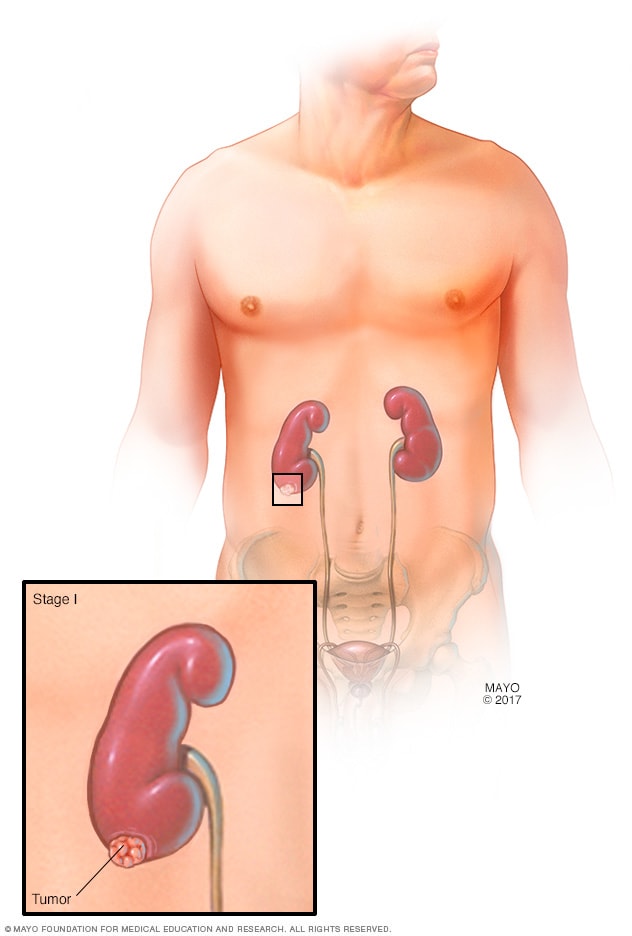
Stage 1 kidney cancer
A stage 1 kidney cancer means that the tumor in the kidney is 2 3/4 inches (7 centimeters) in diameter or smaller. The cancer is only in one kidney and completely contained within it.
Stage 2 kidney cancer
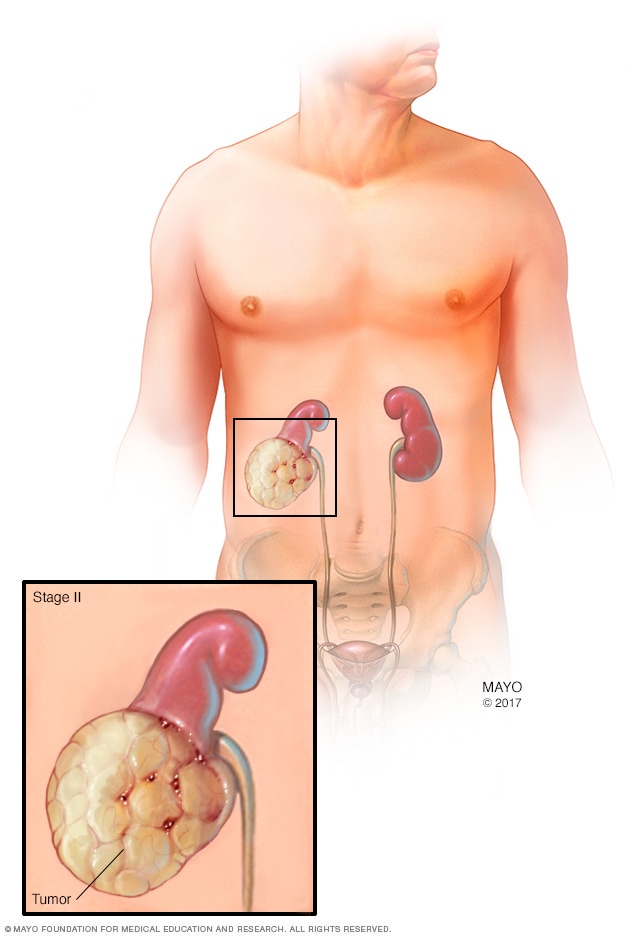
Stage 2 kidney cancer
A stage 2 kidney cancer means that the tumor in the kidney is larger than 2 3/4 inches (7 centimeters) in diameter, but it's still confined to the kidney.
Stage 3 kidney cancer
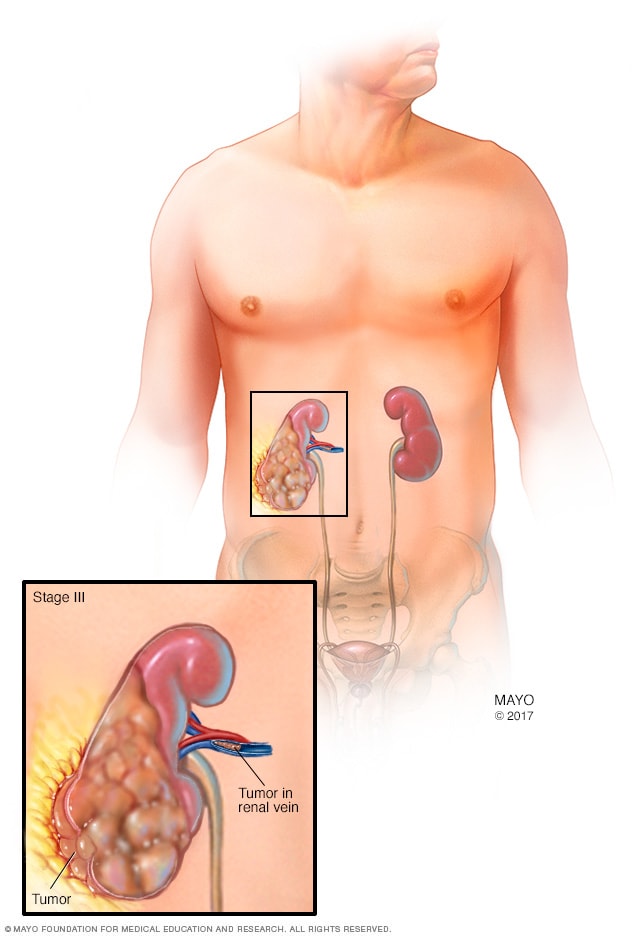
Stage 3 kidney cancer
A stage 3 kidney cancer may mean that the tumor in the kidney extends to the surrounding tissue. It also may mean that the cancer has spread to nearby lymph nodes.
Stage 4 kidney cancer
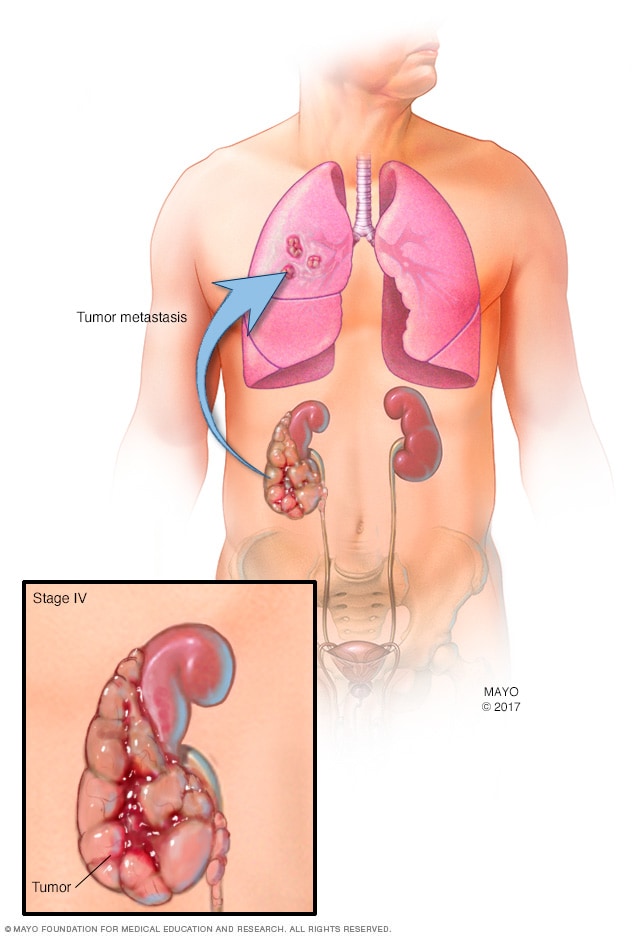
Stage 4 kidney cancer
A stage 4 kidney cancer may mean that the tumor has grown beyond the kidney. It also may mean that the cancer has spread to other parts of the body, such as the bones, liver or lungs.
Kidney cancer diagnosis often begins with a physical exam and a discussion of your health history. Blood and urine tests as well as imaging tests may be used. A sample of tissue may be taken for lab testing.
Tests and procedures used to diagnose kidney cancer include:
Blood and urine tests
Tests of your blood and urine may give your healthcare team clues about what's causing your symptoms. Blood tests may check for the number of red blood cells in the body. Urine tests may look for substances in the urine, such as blood, bacteria and cancer cells.
Imaging tests
Imaging tests make pictures of the body. They can show the location and size of a kidney cancer. Tests might include ultrasound, CT or MRI.
Biopsy
A biopsy is a procedure to remove a sample of tissue for testing in a lab. For kidney cancer, a thin needle is inserted into the kidney or other body part such as the lymph nodes. A healthcare professional uses the needle to remove a sample of tissue. A biopsy may not be needed if imaging tests show enough information to make a diagnosis.
Kidney cancer staging
If you're diagnosed with kidney cancer, the next step is to determine the cancer's extent, called the stage. Your healthcare team uses the cancer staging test results to help create your treatment plan. Staging tests for kidney cancer may include additional CT and MRI scans.
The stages of kidney cancer range from 1 to 4. A stage 1 kidney cancer is small and confined to the kidney. As the cancer gets larger, the stages get higher. A stage 4 kidney cancer has grown beyond the kidney or spread to other parts of the body.
More Information
Treatment
Kidney cancer treatment sometimes begins with surgery to remove the cancer. For cancers confined to the kidney, this may be the only treatment needed. Sometimes medicine is given after surgery to lower the risk that the cancer will come back. If the cancer has spread beyond the kidney, surgery might not be possible. Other treatments may be recommended.
Your healthcare team considers many factors when creating a treatment plan. These factors may include your overall health, the type and stage of your cancer, and your preferences.
Surgery
Partial nephrectomy
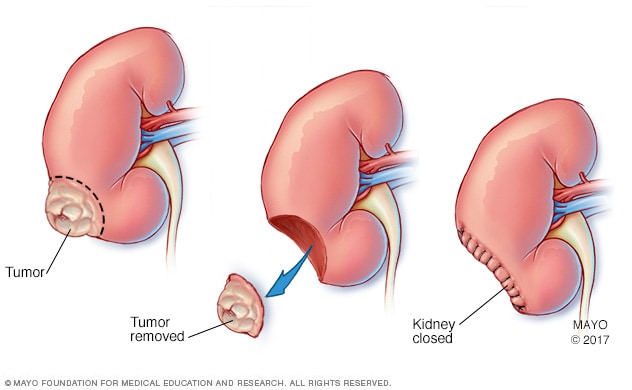
Partial nephrectomy
During a partial nephrectomy, only the cancerous tumor or diseased tissue is removed (center), leaving in place as much healthy kidney tissue as possible. Partial nephrectomy is also called kidney-sparing surgery.
For most cancers confined to the kidney, surgery is the first treatment. The goal of surgery is to remove the cancer while preserving kidney function, when possible. Operations used to treat kidney cancer include:
-
Removing the affected kidney. A complete nephrectomy, also known as a radical nephrectomy, involves removing the entire kidney and a border of healthy tissue around it. Nearby tissues such as the lymph nodes, adrenal gland or other structures also may be removed.
The surgeon may perform a nephrectomy through a single incision in the abdomen or side, called an open nephrectomy. The surgeon also may use a series of small incisions in the abdomen, known as laparoscopic or robot-assisted laparoscopic nephrectomy.
-
Removing the cancer from the kidney. A partial nephrectomy involves removing the cancer and a small margin of healthy tissue that surrounds it rather than the entire kidney. This procedure also is called kidney-sparing or nephron-sparing surgery. It can be done as an open procedure, laparoscopically or with robotic assistance.
Kidney-sparing surgery is a common treatment for small kidney cancers and it may be an option if you have only one kidney. When possible, kidney-sparing surgery is generally preferred over a complete nephrectomy to preserve kidney function. It also may reduce the risk of later complications, such as kidney disease and the need for dialysis.
The type of surgery you have is based on your cancer and its stage, as well as your overall health.
Cryoablation
Cryoablation is a treatment to freeze cancer cells. During cryoablation, a special hollow needle is inserted through the skin and into the kidney cancer using ultrasound or other image guidance. Cold gas in the needle is used to freeze the cancer cells.
Cryoablation can treat small kidney cancers in certain situations. It might be used in people who have other health concerns that make surgery risky.
Radiofrequency ablation
Radiofrequency ablation is a treatment to heat cancer cells. During radiofrequency ablation, a special probe is inserted through the skin and into the kidney cancer using ultrasound or other imaging to guide placement of the probe. An electrical current is run through the needle and into the cancer cells. This causes the cells to heat up or burn.
Radiofrequency ablation can treat small kidney cancers in certain situations. It might be used in people who have other health concerns that make surgery risky.
Radiation therapy
Radiation therapy treats cancer with powerful energy beams. The energy can come from X-rays, protons or other sources. During radiation therapy, you lie on a table while a machine moves around you. The machine directs radiation to precise points on your body.
Radiation therapy can be used on the kidney to kill the cancer cells. It also can help control or reduce symptoms of kidney cancer that has spread to other areas of the body, such as the bones and brain.
Targeted therapy
Targeted therapy for cancer is a treatment that uses medicines that attack specific chemicals in the cancer cells. By blocking these chemicals, targeted treatments can cause cancer cells to die.
Immunotherapy
Immunotherapy for cancer is a treatment with medicine that helps the body's immune system kill cancer cells. The immune system fights off cancer and other cells that shouldn't be in the body. Cancer cells survive by hiding from the immune system. Immunotherapy helps the immune system cells find and kill the cancer cells.
For kidney cancer, immunotherapy may be used after surgery to kill any cancer cells that might remain. It also may be used when the cancer grows very large or spreads to other parts of the body.
Chemotherapy
Chemotherapy treats cancer with strong medicines. Many chemotherapy medicines exist. Most are given through a vein. Usually, kidney cancers are resistant to chemotherapy. However, it may be used for certain rare types of kidney cancer.
Palliative care
Palliative care is a special type of healthcare that helps you feel better when you have a serious illness. If you have cancer, palliative care can help relieve pain and other symptoms. A healthcare team that may include doctors, nurses and other specially trained health professionals provides palliative care. The care team's goal is to improve quality of life for you and your family.
Palliative care specialists work with you, your family and your care team. They provide an extra layer of support while you have cancer treatment. You can have palliative care at the same time you're getting strong cancer treatments, such as surgery, chemotherapy, immunotherapy, targeted therapy or radiation therapy.
The use of palliative care with other proper treatments can help people with cancer feel better and live longer.
More Information
Clinical trials
Explore Mayo Clinic studies testing new treatments, interventions and tests as a means to prevent, detect, treat or manage this condition.
Alternative medicine
Alternative medicine therapies can't cure kidney cancer. But some integrative treatments can be combined with your healthcare team's care to help you cope with side effects of cancer and its treatment, such as distress.
People with cancer often experience distress. If you're distressed, you may have difficulty sleeping and find yourself constantly thinking about your cancer.
Discuss your feelings with your healthcare team. Specialists can help you find ways of coping. In some cases, medicines may help.
Integrative medicine treatments also may help you feel better, including:
- Acupuncture.
- Art therapy.
- Exercise.
- Massage therapy.
- Meditation.
- Music therapy.
- Relaxation exercises.
- Spirituality.
Talk with your healthcare team if you're interested in these treatment options.
Coping and support
With time, you'll find what helps you cope with the uncertainty and worry of a cancer diagnosis. Until then, you may find it helps to:
Learn enough about kidney cancer to make decisions about your care
Ask your healthcare team about your cancer, including your test results, treatment options and, if you like, your prognosis. As you learn more about kidney cancer, you may become more confident in making treatment decisions.
Keep friends and family close
Keeping your close relationships strong can help you deal with kidney cancer. Friends and family can provide the practical support you may need, such as helping take care of your home if you're in the hospital. And they can serve as emotional support when you feel overwhelmed by having cancer.
Find someone to talk with
Find someone who is willing to listen to you talk about your hopes and worries. This may be a friend or family member. The concern and understanding of a counselor, medical social worker, clergy member or cancer support group also may be helpful.
Ask your healthcare team about support groups in your area. Other sources of information include the National Cancer Institute and the American Cancer Society.
Preparing for your appointment
Make an appointment with a doctor or other healthcare professional if you have any symptoms that worry you.
If your healthcare professional thinks you might have kidney cancer, you may be referred to a doctor who specializes in urinary tract diseases and conditions, called a urologist. If a cancer diagnosis is made, you also may be referred to a doctor who specializes in treating cancer, called an oncologist.
Because appointments can be brief, it's a good idea to be prepared. Here's some information to help you get ready.
What you can do
- Be aware of any pre-appointment restrictions. At the time you make the appointment, be sure to ask if there's anything you need to do in advance, such as restrict your diet.
- Write down symptoms you have, including any that may not seem related to the reason for which you scheduled the appointment.
- Write down important personal information, including major stresses or recent life changes.
- Make a list of all medicines, vitamins or supplements you're taking and the doses.
- Take a family member or friend along. Sometimes it can be very hard to remember all the information provided during an appointment. Someone who goes with you may remember something that you missed or forgot.
- Write down questions to ask your healthcare team.
Your time with your healthcare team is limited, so preparing a list of questions can help you make the most of your time together. List your questions from most important to least important in case time runs out. For kidney cancer, some basic questions to ask include:
- Do I have kidney cancer?
- What is the stage of my kidney cancer?
- Has my kidney cancer spread to other parts of my body?
- Will I need more tests?
- What are the treatment options?
- How much does each treatment increase my chances of a cure or prolong my life?
- What are the potential side effects of each treatment?
- How will each treatment affect my daily life?
- Is there one treatment option you believe is the best?
- What would you recommend to a friend or family member in my situation?
- Should I see a specialist?
- Are there any brochures or other printed material that I can take with me? What websites do you recommend?
- What will determine whether I should plan for a follow-up visit?
Don't hesitate to ask other questions.
What to expect from your doctor
Be prepared to answer questions, such as:
- When did your symptoms begin?
- Have your symptoms been continuous or occasional?
- How severe are your symptoms?
- What, if anything, seems to improve your symptoms?
- What, if anything, appears to worsen your symptoms?
Aug. 17, 2024